Top Unity Alternatives in 2025 — Pricing, Pros, Cons, Features
Written by: Hrishikesh Pardeshi, Founder at Flexiple, buildd & Remote Tools.
Last updated: Jan 26, 2025
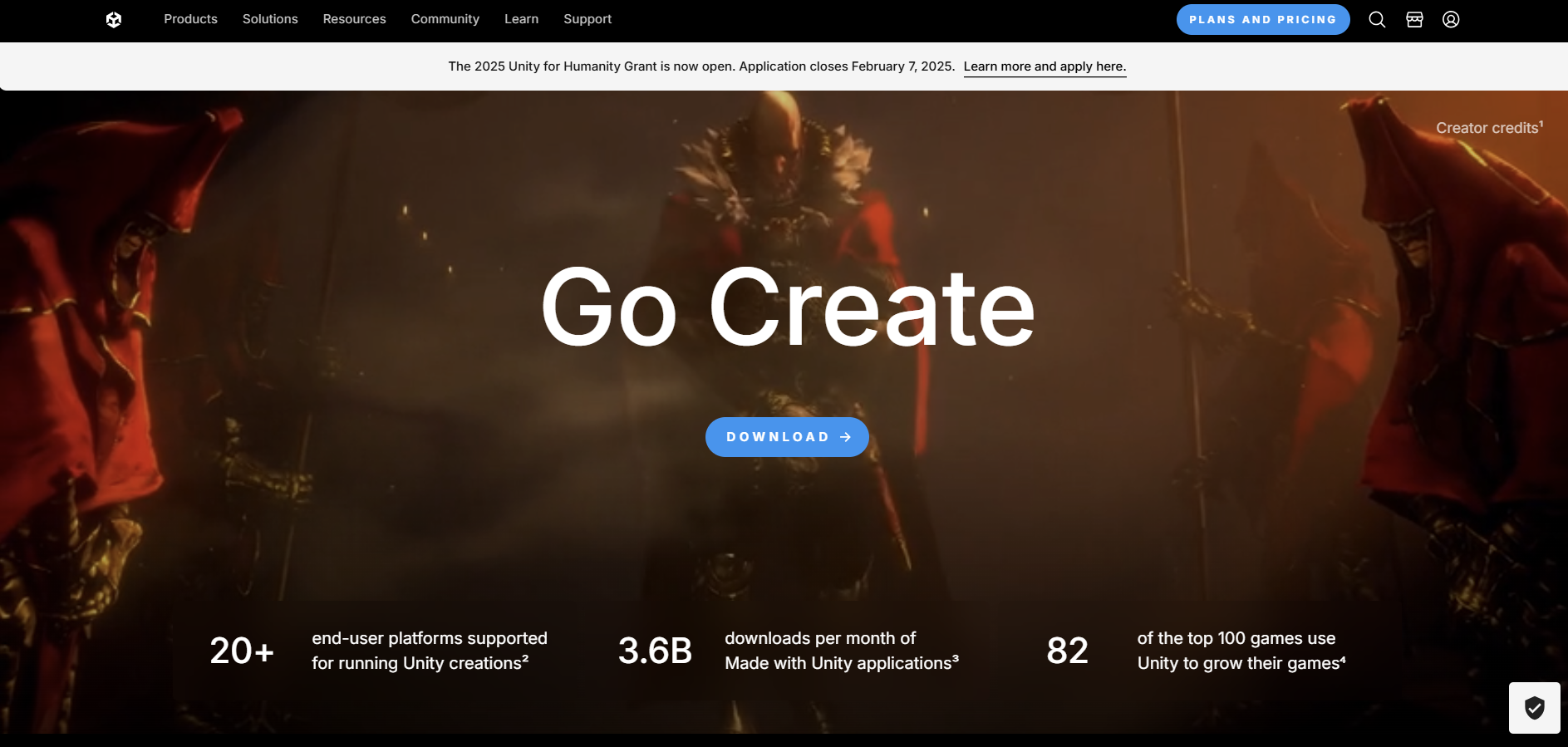
Best Unity Alternatives in 2025 are:
Unreal Engine
Godot Engine
CryEngine
GameMaker Studio
Defold
Cocos2d-x
Buildbox
If you're looking for Unity game engine alternatives, these alternative game engines offer a wide variety of features tailored to different needs. Whether you need advanced rendering capabilities, simplified workflows, or specialized tools for 2D or 3D game development, these platforms make game development accessible for creators of all levels. From Unreal Engine’s photorealistic visuals to Godot Engine’s open-source flexibility, each alternative offers unique advantages to enhance your development process. Additionally, some of these engines are designed for seamless integration with web platforms, while others empower game developers to create with their own engine, ensuring adaptability for diverse project requirements.
Table of Contents
Why You Need Alternatives to Unity?
You need alternatives to Unity because Unity does not always meet every developer's requirements. Reasons include the cost of subscription plans, licensing concerns, or specific feature gaps such as high-end graphics rendering or lightweight solutions for smaller projects. Exploring alternatives to Unity ensures you can choose the right game engine for your project, whether it’s a AAA title, an indie game, or a mobile application.
Who Should Consider Using Unity Alternatives?
You should consider using Unity alternatives if Unity doesn’t align with your specific needs or project goals. For instance, professionals looking for high-end rendering might prefer Unreal Engine, while developers seeking a lightweight, free solution for 2D games might find Godot Engine or Defold more suitable. Similarly, teams working on browser-based games could benefit from Cocos2d-x, which is optimized for lightweight performance.
Unity Alternatives Comparison Table
| Feature | Unreal Engine | Godot Engine | CryEngine | GameMaker Studio | Defold | Cocos2d-x | Buildbox |
|---|---|---|---|---|---|---|---|
| Ease of Use | Moderate | Easy | Difficult | Very Easy | Easy | Moderate | Very Easy |
| Pricing | Free with royalties | Free | Pay what you want | Free & Paid Plans | Free | Free | Free & Paid Plans |
| Platform Support | PC, Consoles, VR, Mobile | PC, Mobile, Web | PC, Consoles | PC, Mobile | PC, Mobile, Web | PC, Mobile, Web | PC, Mobile |
| Advanced Rendering | Excellent | Good | Excellent | Basic | Basic | Good | Limited |
| Prototyping Tools | Advanced | Intermediate | Advanced | Basic | Intermediate | Intermediate | Very Basic |
Best Unity Alternatives
Game development has evolved significantly, and Unity, while being a powerful engine, may not always align with every developer's needs. Whether you are an indie creator or part of a large studio, exploring Unity alternatives can open up possibilities for better tools tailored to your specific projects. From photorealistic 3D rendering to simplified no-code solutions, these alternatives cater to a wide range of game development requirements. Here’s a look at the best Unity alternatives to consider in 2024.
1. Unreal Engine
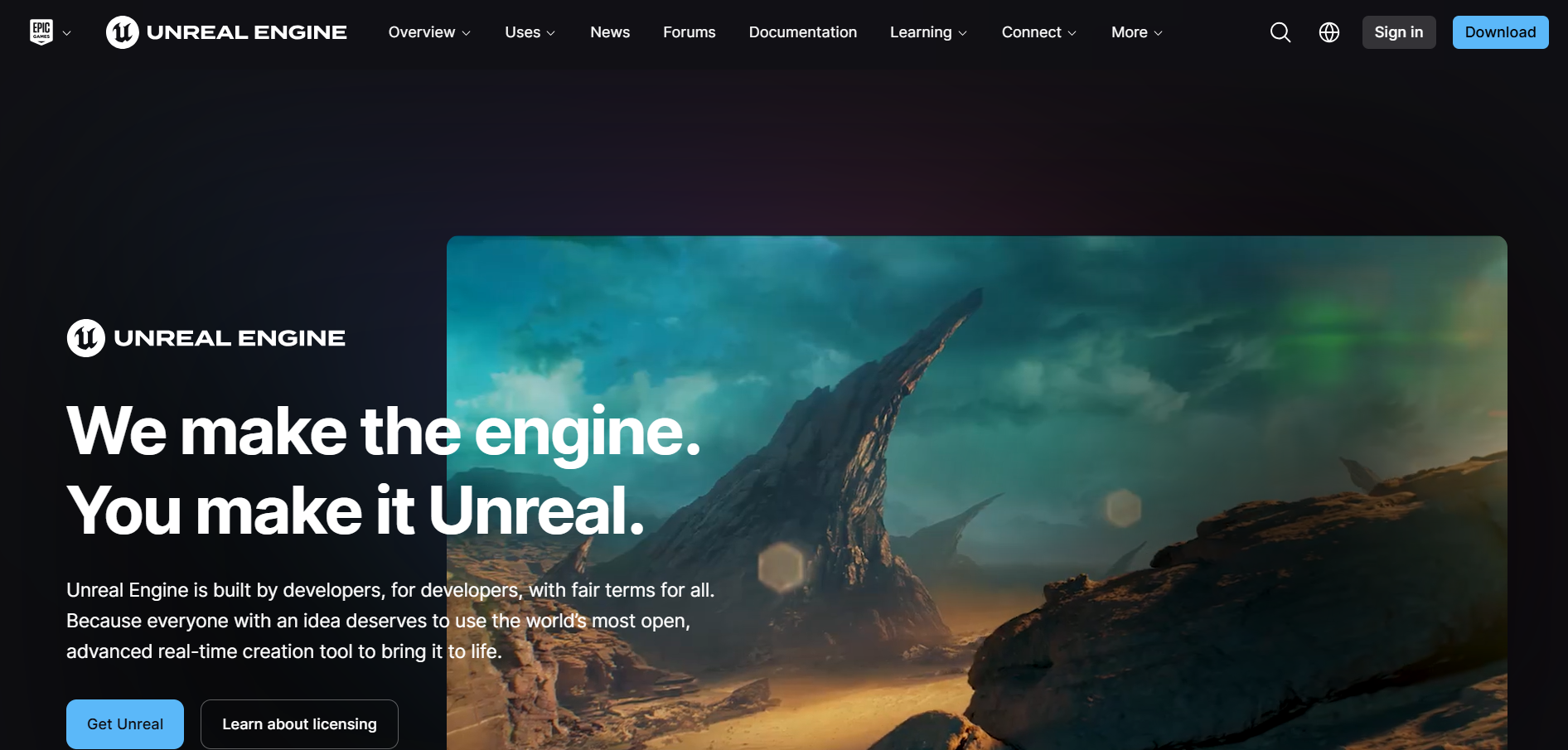
Unreal Engine is a powerful game engine developed by Epic Games, renowned for its cutting-edge graphics and capabilities for creating photorealistic 3D visuals. It is widely used in AAA game development, architecture visualization, and even film production.
Unreal Engine vs Unity
Unreal Engine is often compared to Unity due to its superior rendering capabilities. While Unity is more versatile and easier for beginners, Unreal Engine shines in producing high-quality, realistic visuals and supports advanced rendering features like ray tracing and global illumination.
Key Features of Unreal Engine
Advanced rendering with real-time ray tracing
Blueprint visual scripting system for non-coders
Asset marketplace for free and paid content
Cross-platform support for PC, consoles, mobile, and VR
Built-in multiplayer and networking capabilities
Unreal Engine Pros
Industry-leading graphics rendering
Blueprint system simplifies game logic creation
Extensive asset marketplace
Strong community and developer resources
Free to use until revenue exceeds $1 million
Unreal Engine Cons
High system requirements for optimal performance
Steeper learning curve compared to Unity
Larger project file sizes due to its robust features
Unreal Engine Pricing
Unreal Engine is free to use, with a 5% royalty fee on gross revenue exceeding $1 million per project.
2. Godot Engine
Godot Engine is an open-source game engine designed for 2D and 3D game development. Its lightweight nature and extensive documentation make it an excellent choice for indie developers and small teams.
Godot Engine vs Unity
Godot Engine provides a completely free and open-source alternative to Unity. While Unity excels in large-scale 3D projects, Godot is ideal for 2D games and smaller-scale 3D projects. Godot’s scripting language, GDScript, is designed for ease of use and rapid development.
Key Features of Godot Engine
Node-based architecture for game design
Built-in scripting with GDScript, C#, and VisualScript
Cross-platform export for major platforms
Lightweight and resource-efficient
Completely open-source with no licensing fees
Godot Engine Pros
Free and open-source with no royalties
Lightweight and easy to learn
Strong focus on 2D game development
Flexible scripting options
Active and supportive community
Godot Engine Cons
Limited advanced 3D rendering features
Smaller asset marketplace compared to Unity
Less suitable for AAA projects
Godot Engine Pricing
Godot Engine is completely free, with no royalties or licensing fees.
3. CryEngine
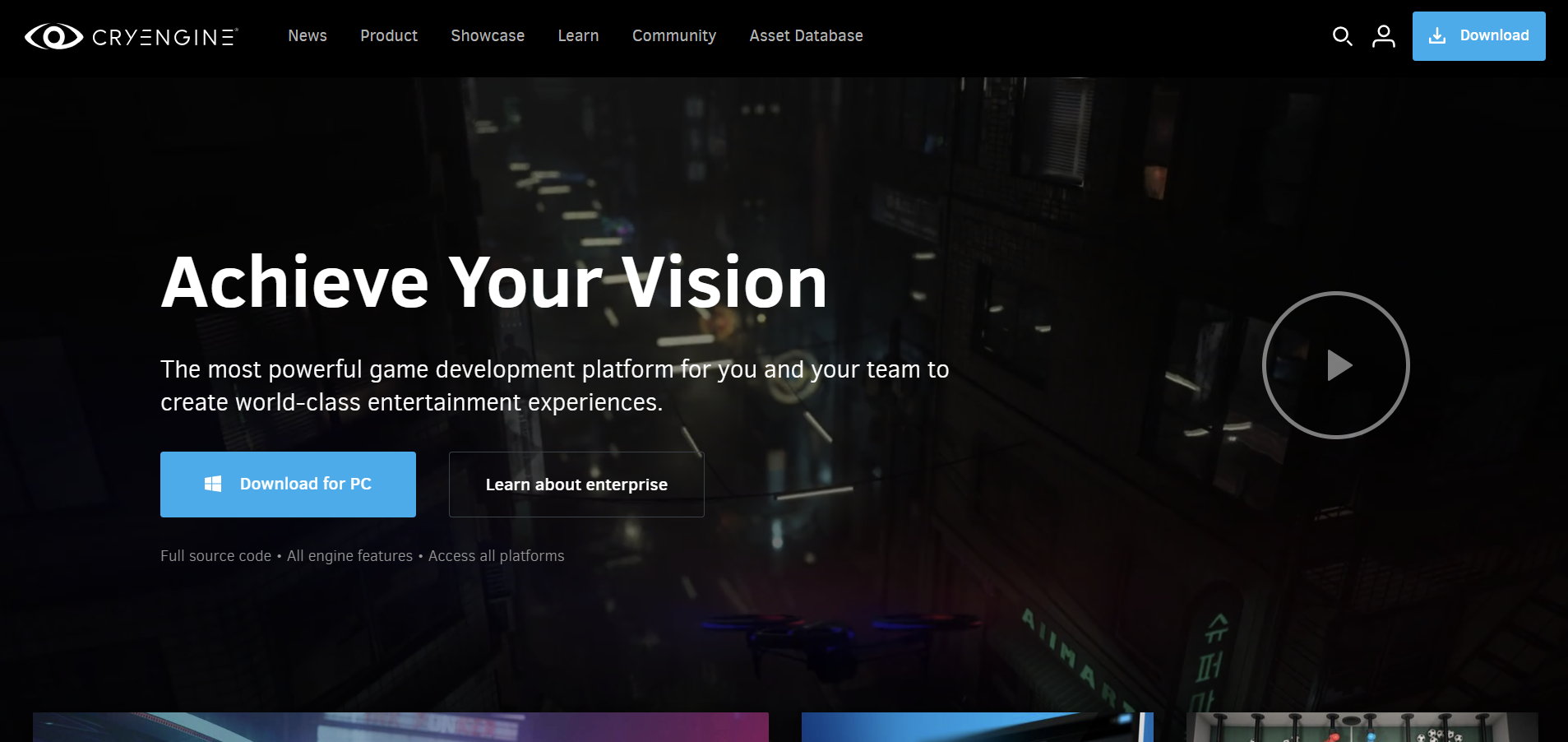
CryEngine is a high-performance game engine developed by Crytek, known for its stunning visuals and real-time rendering capabilities. It is often used for creating visually demanding 3D games.
CryEngine vs Unity
CryEngine excels in high-end graphics rendering, similar to Unreal Engine, but with a slightly smaller community. Unity, on the other hand, offers broader accessibility and more user-friendly tools, making it better for beginners and small teams.
Key Features of CryEngine
Real-time rendering with advanced lighting systems
Sandbox editor for streamlined game design
Flow Graph visual scripting system
Support for VR and AR development
Full source code access
CryEngine Pros
Exceptional graphics rendering capabilities
Powerful built-in tools for terrain and environment design
Comprehensive documentation
Full access to source code
Competitive licensing model
CryEngine Cons
Steep learning curve
Fewer learning resources compared to Unity
Smaller community and third-party plugin support
CryEngine Pricing
CryEngine operates on a pay-what-you-want model, with no mandatory fees or royalties.
4. GameMaker Studio
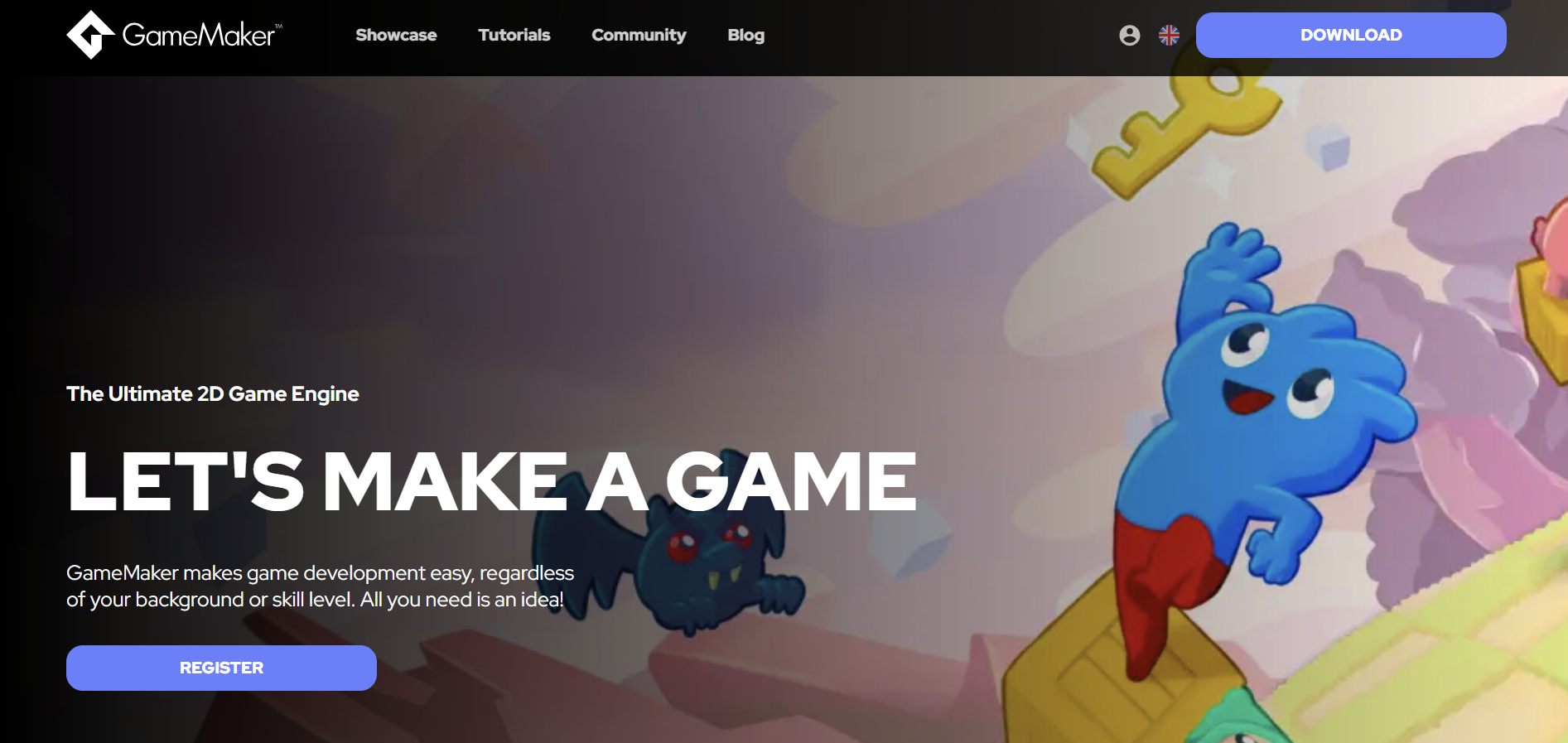
GameMaker Studio is a user-friendly game engine designed for 2D game development. It is widely used by indie developers for creating simple to moderately complex games.
GameMaker Studio vs Unity
While Unity is a versatile tool for 2D and 3D games, GameMaker Studio is focused solely on 2D development, offering a more streamlined experience for developers working in this space. It features drag-and-drop tools that simplify game design for non-coders.
Key Features of GameMaker Studio
Drag-and-drop interface for easy game creation
Support for custom scripting with GameMaker Language (GML)
Extensive library of pre-built assets and templates
Cross-platform support for desktop, mobile, and console
Built-in physics and particle effects
GameMaker Studio Pros
Beginner-friendly with a drag-and-drop interface
Excellent for 2D game development
Strong support for mobile game development
Large community and active forums
Regular updates with new features
GameMaker Studio Cons
Limited 3D capabilities
Subscription fees for advanced features
Less suitable for large-scale projects
GameMaker Studio Pricing
GameMaker Studio offers a free version with limited features, and paid plans start at $39 per year for the Creator license.
5. Defold
Defold is a lightweight, open-source game engine tailored for 2D game development. It is ideal for creating cross-platform games with minimal system requirements.
Defold vs Unity
Defold is simpler and more lightweight compared to Unity, making it ideal for smaller 2D projects and mobile games. Unity, however, offers a wider range of features and better support for 3D development.
Key Features of Defold
Lightweight architecture for efficient performance
Cross-platform export for desktop, mobile, and web
Built-in tools for animation and particle effects
Visual editor with Lua scripting
Open-source with active community support
Defold Pros
Lightweight and resource-efficient
Excellent for mobile and browser-based games
Free and open-source
Strong documentation and learning resources
Regular updates from the development team
Defold Cons
Limited support for 3D games
Smaller community compared to Unity
Lacks advanced rendering features
Defold Pricing
Defold is completely free and open-source, with no licensing fees or royalties.
6. Cocos2d-x
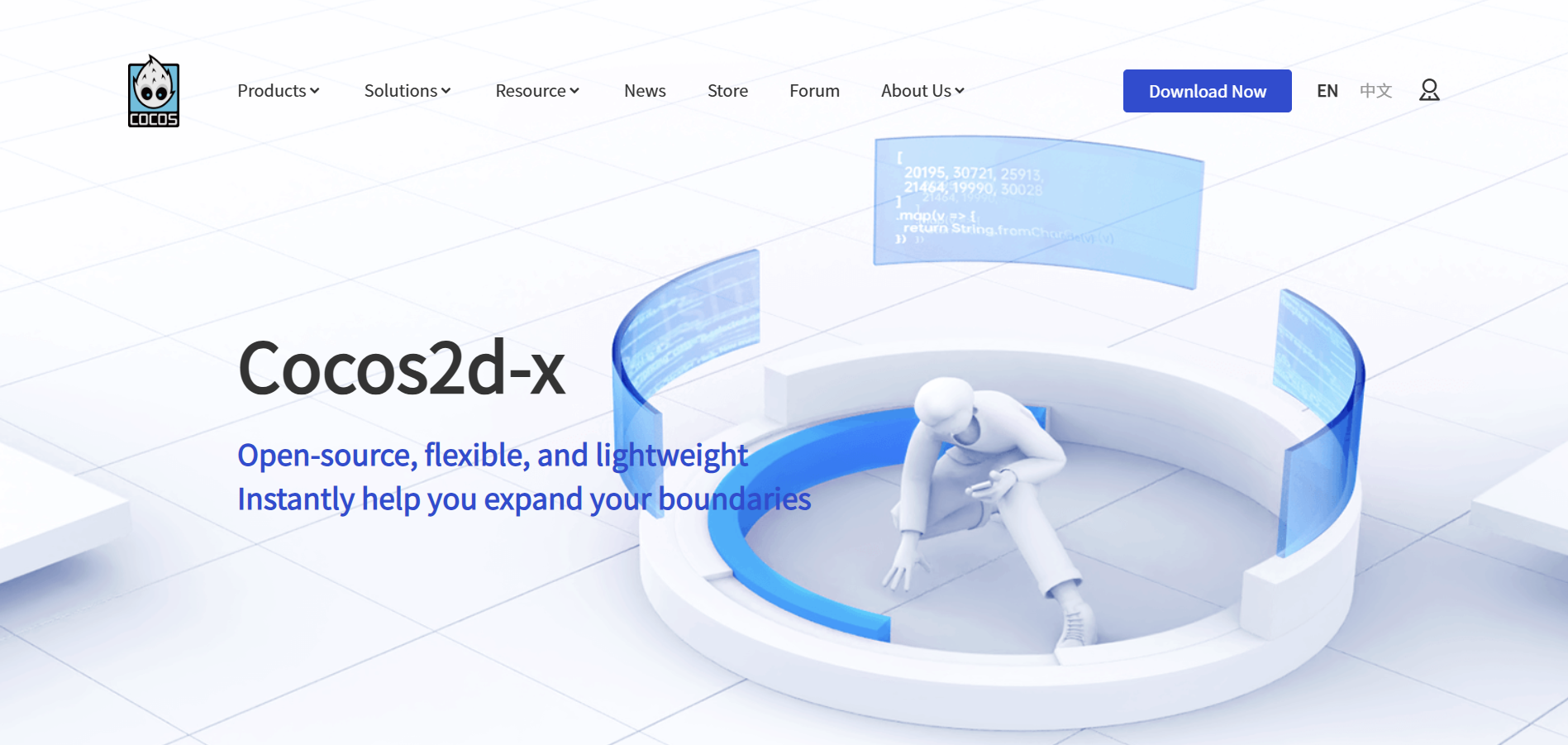
Cocos2d-x is an open-source game engine focused on 2D game development. It is widely used for mobile and browser-based games due to its lightweight performance and flexibility.
Cocos2d-x vs Unity
Cocos2d-x is more lightweight and efficient than Unity, making it ideal for mobile games and applications. However, Unity offers more advanced tools and a larger community for developers working on complex projects.
Key Features of Cocos2d-x
Lightweight and optimized for mobile devices
Support for multiple programming languages, including C++, Lua, and JavaScript
Extensive asset library for 2D game development
Cross-platform support for mobile and web
Open-source with customizable features
Cocos2d-x Pros
Free and open-source
Optimized for mobile performance
Flexible programming options
Large library of 2D assets
Active community and developer support
Cocos2d-x Cons
Limited support for 3D games
Steeper learning curve for beginners
Smaller community compared to Unity
Cocos2d-x Pricing
Cocos2d-x is free and open-source, with no licensing fees or royalties.
7. Buildbox
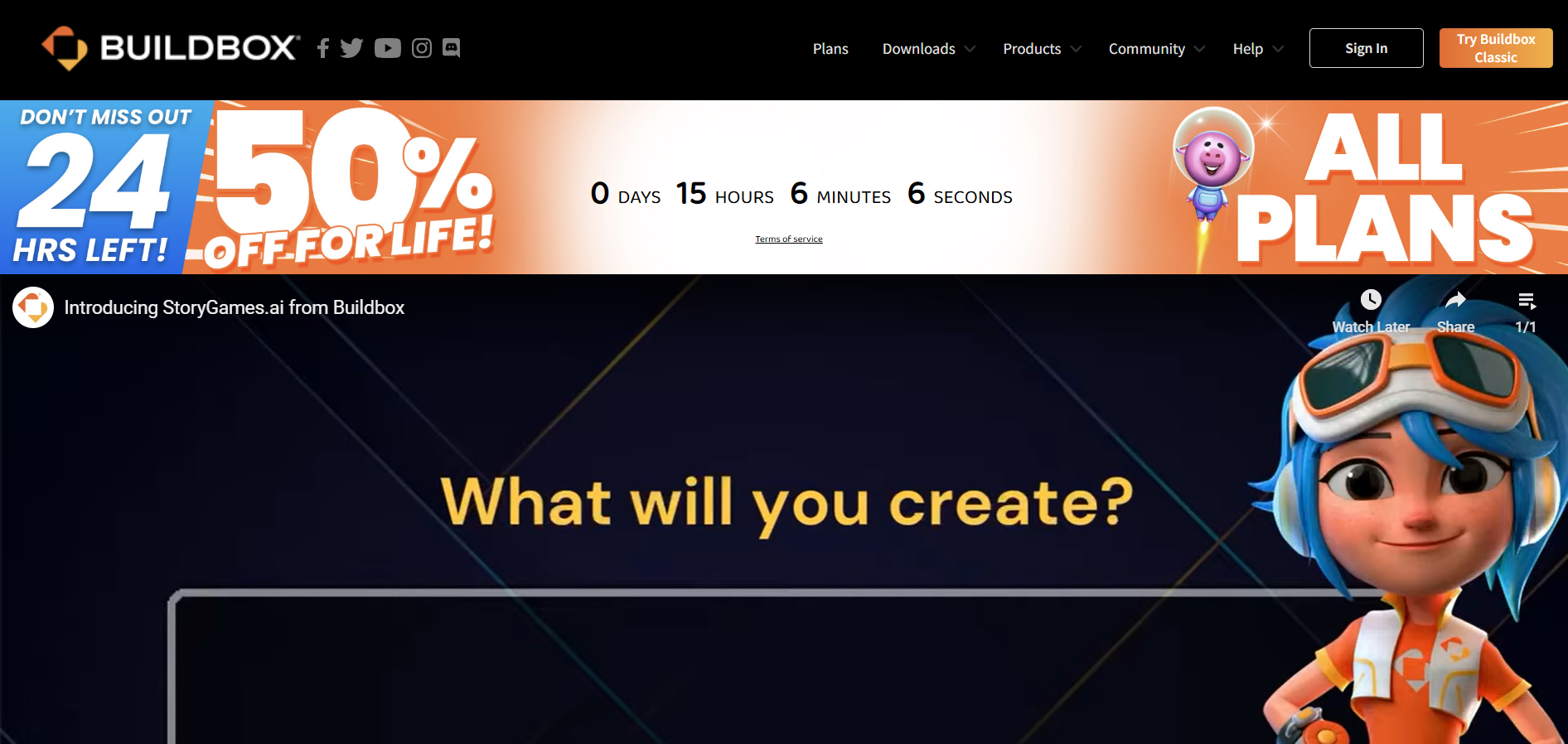
Buildbox is a no-code game development platform designed for creating 2D and 3D games quickly. It is ideal for beginners and non-developers who want to create games without extensive coding knowledge.
Buildbox vs Unity
Buildbox focuses on simplicity and speed, making it an excellent choice for rapid game development. Unity, on the other hand, offers more advanced features and flexibility for developers willing to invest time in learning the platform.
Key Features of Buildbox
No-code game creation with drag-and-drop tools
Pre-built templates for faster development
Cross-platform export for mobile and desktop
Built-in monetization tools
Asset store for free and paid resources
Buildbox Pros
Extremely user-friendly with no coding required
Ideal for rapid prototyping and game development
Built-in tools for in-app purchases and ads
Extensive library of pre-built templates
Strong focus on mobile game development
Buildbox Cons
Limited advanced customization options
Higher subscription costs compared to other engines
Less suitable for complex or large-scale projects
Buildbox Pricing
Buildbox offers a free version with limited features, and paid plans start at $15 per month.
FAQs On Unity Alternatives
1. What are the top alternatives to Unity?
The top alternatives to Unity include Unreal Engine, Godot Engine, CryEngine, GameMaker Studio, Defold, Cocos2d-x, and Buildbox. Each of these engines offers unique features tailored to different game development needs.
2. Why should I consider using an alternative to Unity?
You should consider using an alternative to Unity if you need specific features like advanced rendering, a lightweight engine, or a more cost-effective solution. Alternatives like Unreal Engine excel in photorealistic visuals, while Godot and Defold offer free, open-source solutions for indie developers.
3. Are Unity alternatives free to use?
Many Unity alternatives are free, such as Godot Engine, Defold, and Cocos2d-x. Others, like Unreal Engine, are free to use with royalties on revenue, while some, like Buildbox, offer both free and paid plans.
4. Which Unity alternative is best for beginners?
Buildbox and GameMaker Studio are excellent choices for beginners due to their user-friendly interfaces and no-code or low-code tools. They allow new developers to create games quickly without extensive programming knowledge.
5. Can I use Unity alternatives for professional projects?
Yes, Unity alternatives like Unreal Engine, CryEngine, and Godot Engine are widely used in professional game development. They offer robust tools and capabilities for creating high-quality games, whether for indie studios or large-scale productions.